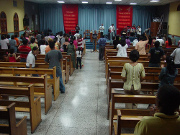 |
| (Photos by Brian Russell) |
Venezuela (MNN) ― In a re-election to another six-year term, Venezuela's President Hugo Chavez defeated Henrique Capriles by a 10% point margin in the presidential election.
The win marks Chavez's fourth presidential election victory since 1998. It also means more of the same leftist-leaning policies. Some of these have earned Venezuela a dubious reputation.
In fact, the 2012 U.S. Commission on International Religious Freedom Watch List includes Afghanistan, Belarus, Cuba, India, Indonesia, Laos, Russia, Somalia, and Venezuela. Venezuela has been on USCIRF's Watch List since 2009.
According to the USCIRF, "The Watch List provides advance warning of negative trends that could develop into severe violations of religious freedom, thereby providing policymakers with the opportunity to engage early and increasing the likelihood of preventing or diminishing the violations."
In that report, investigators found continued violations of freedom of religion. These included: government failure to hold accountable those behind attacks on religious leaders and houses of worship, virulent rhetoric from President Hugo Chavez, government officials, state media, and pro-Chavez media directed episodically against the certain faith-based communities.
Since President Chavez first came to office in 1998, there has been a steady increase of government rhetoric, and in some cases government actions, against the faith-based groups thought to have ties with the West.
Greg Musselman, spokesman for Voice of the Martyrs Canada,says it's not likely things will change in the direction of more freedom. "Chavez, being close with the Castro (Cuban regime), would have similar kinds of policies against the Church, which would be having more control over the church. And if they didn't go along with the policies of the government, or if they were in any way seen even preaching the Gospel--which will conflict with an ideology like Hugo Chavez, that could cause problems for the Church."
As Chavez flexed his muscle over the economy, non-governmental organizations, and society, he simultaneously seemed to be backtracking on democracy and respect for human rights. There are no official restrictions on religious practice, but Chavez' actions have created a hostile ministry environment. Musselman explains, "It's more of subtle persecution. It's still things that are happening against the Church. It's a church leader who has a second job and may lose his job."
That is likely to continue if Chavez continues to trend the way he's been going. "If things do get more difficult, pray that the church would be strengthened, that believers would be prepared for churches to close down."
One of the more obvious manifestations of Chavez ideology was seen in November 2005. President Chavez gave all New Tribes missionaries ninety days to leave tribal areas of the country. The order effectively revoked a forty-year-old permit given to the mission.
After so many years' presence for NTM, what changed? Musselman says it was a rise in nationalistic fervor. "Christianity can often be labeled as ‘Americanism' or ‘coming from the West.' If he would view missionaries as ‘westerners' in some way, undermining his control, he would be in much opposition of that." NTM appealed the order, but the Supreme Court allowed it to stand, leading to the relocation of missionaries in the tribal areas in February 2006.
In the meantime, there have been scattered reports of church bombings and other assaults, and slow justice. That's another hallmark of a country that's steadily moving toward unfriendly territory for Christians. First, says Musselman, "That may not be bad for the church because it'll cleanse it. There has been quite a compromise amongst many of the leaders."
Second, Musselman spoke with a prominent church leader in Venezuela: Nelson Castro (no relation to Cuba's Fidel Castro), a former colonel who served with Hugo Chavez. He understands Chavez' ideology which is why "he expects things will get worse in Venezuela, and there will be closing down of churches. In his opinion, the Church has started to go underground."
As that begins to unfold, Musselman says, "The main prayer request is that the church would be strong, that they would continue to preach the Gospel, certainly in humility and love, but not compromise as has been the case in the last number of years."
No comments:
Post a Comment